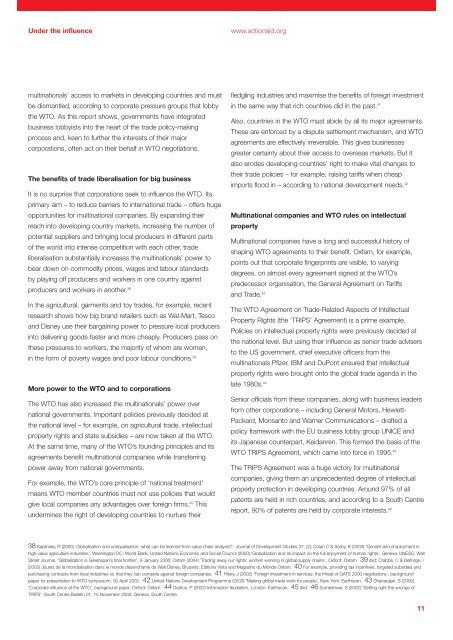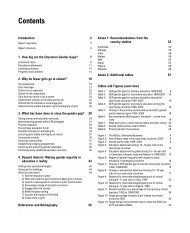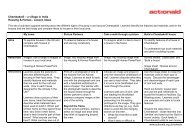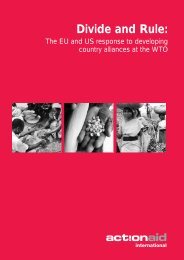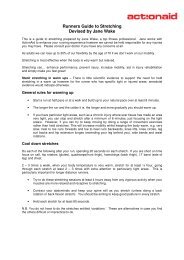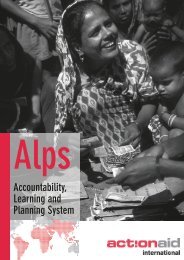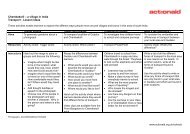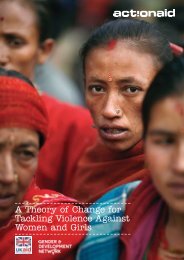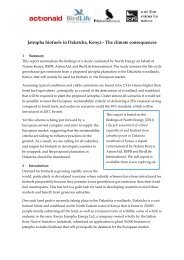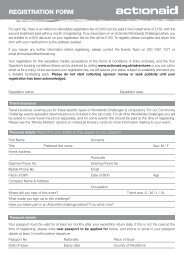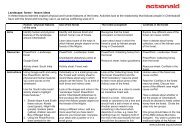UNDER THE INFLUENCE - ActionAid
UNDER THE INFLUENCE - ActionAid
UNDER THE INFLUENCE - ActionAid
Create successful ePaper yourself
Turn your PDF publications into a flip-book with our unique Google optimized e-Paper software.
Under the influence<br />
www.actionaid.org<br />
multinationals’ access to markets in developing countries and must<br />
be dismantled, according to corporate pressure groups that lobby<br />
the WTO. As this report shows, governments have integrated<br />
business lobbyists into the heart of the trade policy-making<br />
process and, keen to further the interests of their major<br />
corporations, often act on their behalf in WTO negotiations.<br />
The benefits of trade liberalisation for big business<br />
It is no surprise that corporations seek to influence the WTO. Its<br />
primary aim – to reduce barriers to international trade – offers huge<br />
opportunities for multinational companies. By expanding their<br />
reach into developing country markets, increasing the number of<br />
potential suppliers and bringing local producers in different parts<br />
of the world into intense competition with each other, trade<br />
liberalisation substantially increases the multinationals’ power to<br />
bear down on commodity prices, wages and labour standards<br />
by playing off producers and workers in one country against<br />
producers and workers in another. 38<br />
In the agricultural, garments and toy trades, for example, recent<br />
research shows how big brand retailers such as Wal-Mart, Tesco<br />
and Disney use their bargaining power to pressure local producers<br />
into delivering goods faster and more cheaply. Producers pass on<br />
these pressures to workers, the majority of whom are women,<br />
in the form of poverty wages and poor labour conditions. 39<br />
More power to the WTO and to corporations<br />
The WTO has also increased the multinationals’ power over<br />
national governments. Important policies previously decided at<br />
the national level – for example, on agricultural trade, intellectual<br />
property rights and state subsidies – are now taken at the WTO.<br />
At the same time, many of the WTO’s founding principles and its<br />
agreements benefit multinational companies while transferring<br />
power away from national governments.<br />
For example, the WTO’s core principle of ‘national treatment’<br />
means WTO member countries must not use policies that would<br />
give local companies any advantages over foreign firms. 40 This<br />
undermines the right of developing countries to nurture their<br />
fledgling industries and maximise the benefits of foreign investment<br />
in the same way that rich countries did in the past. 41<br />
Also, countries in the WTO must abide by all its major agreements.<br />
These are enforced by a dispute settlement mechanism, and WTO<br />
agreements are effectively irreversible. This gives businesses<br />
greater certainty about their access to overseas markets. But it<br />
also erodes developing countries’ right to make vital changes to<br />
their trade policies – for example, raising tariffs when cheap<br />
imports flood in – according to national development needs. 42<br />
Multinational companies and WTO rules on intellectual<br />
property<br />
Multinational companies have a long and successful history of<br />
shaping WTO agreements to their benefit. Oxfam, for example,<br />
points out that corporate fingerprints are visible, to varying<br />
degrees, on almost every agreement signed at the WTO’s<br />
predecessor organisation, the General Agreement on Tariffs<br />
and Trade. 43<br />
The WTO Agreement on Trade-Related Aspects of Intellectual<br />
Property Rights (the ‘TRIPS’ Agreement) is a prime example.<br />
Policies on intellectual property rights were previously decided at<br />
the national level. But using their influence as senior trade advisers<br />
to the US government, chief executive officers from the<br />
multinationals Pfizer, IBM and DuPont ensured that intellectual<br />
property rights were brought onto the global trade agenda in the<br />
late 1980s. 44<br />
Senior officials from these companies, along with business leaders<br />
from other corporations – including General Motors, Hewlett-<br />
Packard, Monsanto and Warner Communications – drafted a<br />
policy framework with the EU business lobby group UNICE and<br />
its Japanese counterpart, Keidanren. This formed the basis of the<br />
WTO TRIPS Agreement, which came into force in 1995. 45<br />
The TRIPS Agreement was a huge victory for multinational<br />
companies, giving them an unprecedented degree of intellectual<br />
property protection in developing countries. Around 97% of all<br />
patents are held in rich countries, and according to a South Centre<br />
report, 90% of patents are held by corporate interests. 46<br />
38 Kaplinsky, R (2000) ‘Globalisation and unequalisation: what can be learned from value chain analysis?’, Journal of Development Studies 37, (2); Dolan C & Sorby, K (2003) ‘Gender and employment in<br />
high-value agriculture industries’, Washington DC: World Bank; United Nations Economic and Social Council (2000),‘Globalization and its impact on the full enjoyment of human rights’, Geneva: UNESC; Wall<br />
Street Journal, ‘Globalization is Greenspan’s final frontier’, 9 January 2006; Oxfam (2004) ‘Trading away our rights: women working in global supply chains’, Oxford: Oxfam. 39 ibid; Crabbé, C & Delforge, I<br />
(2002) Jouets de la mondialisation dans le monde désenchanté de Walt Disney, Brussels: Editions Vista and Magasins du Monde Oxfam. 40 For example, providing tax incentives, targeted subsidies and<br />
purchasing contracts from local industries so that they can compete against foreign companies. 41 Hilary, J (2002) ‘Foreign investment in services: the threat of GATS 2000 negotiations’, background<br />
paper for presentation to WTO symposium, 30 April 2002. 42 United Nations Development Programme (2003) ‘Making global trade work for people’, New York: Earthscan. 43 Dhanarajan, S (2002)<br />
‘Corporate influence at the WTO’, background paper, Oxford: Oxfam. 44 Drahos, P (2002) Information feudalism, London: Earthscan. 45 ibid. 46 Someshwar, S (2002) ‘Setting right the wrongs of<br />
TRIPS’, South Centre Bulletin 01, 15 November 2002: Geneva, South Centre.<br />
11


